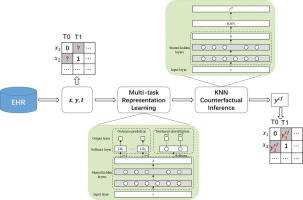Journal of Biomedical informatics ( IF 4.0 ) Pub Date : 2019-10-11 , DOI: 10.1016/j.jbi.2019.103303 Peipei Chen 1 , Wei Dong 2 , Xudong Lu 1 , Uzay Kaymak 3 , Kunlun He 2 , Zhengxing Huang 4

|
Utilizing clinical observational data to estimate individualized treatment effects (ITE) is a challenging task, as confounding inevitably exists in clinical data. Most of the existing models for ITE estimation tackle this problem by creating unbiased estimators of the treatment effects. Although valuable, learning a balanced representation is sometimes directly opposed to the objective of learning an effective and discriminative model for ITE estimation. We propose a novel hybrid model bridging multi-task deep learning and K-nearest neighbors (KNN) for ITE estimation. In detail, the proposed model firstly adopts multi-task deep learning to extract both outcome-predictive and treatment-specific latent representations from Electronic Health Records (EHR), by jointly performing the outcome prediction and treatment category classification. Thereafter, we estimate counterfactual outcomes by KNN based on the learned hidden representations. We validate the proposed model on a widely used semi-simulated dataset, i.e. IHDP, and a real-world clinical dataset consisting of 736 heart failure (HF) patients. The performance of our model remains robust and reaches 1.7 and 0.23 in terms of Precision in the estimation of heterogeneous effect (PEHE) and average treatment effect (ATE), respectively, on IHDP dataset, and 0.703 and 0.796 in terms of accuracy and F1 score respectively, on HF dataset. The results demonstrate that the proposed model achieves competitive performance over state-of-the-art models. In addition, the results reveal several findings which are consistent with existing medical domain knowledge, and discover certain suggestive hypotheses that could be validated through further investigations in the clinical domain.
中文翻译:

深度表示学习,可使用电子健康记录进行个性化治疗效果评估。
利用临床观察数据评估个体化治疗效果(ITE)是一项艰巨的任务,因为临床数据中不可避免地存在混淆。现有的大多数ITE估计模型都是通过创建治疗效果的无偏估计量来解决此问题的。尽管很有价值,但是学习平衡的表示有时有时与学习有效且具有判别力的ITE估计模型的目标相反。我们提出了一种桥接多任务深度学习和K近邻(KNN)的新型混合模型,用于ITE估算。详细地说,该模型首先采用多任务深度学习,通过联合执行结果预测和治疗类别分类,从电子健康记录(EHR)中提取结果预测和特定于治疗的潜在表示。之后,我们根据学习到的隐藏表示,通过KNN估算反事实结果。我们在广泛使用的半模拟数据集(即IHDP)和由736名心力衰竭(HF)患者组成的实际临床数据集上验证了提出的模型。我们模型的性能仍然保持稳健,在IHDP数据集的异质效应(PEHE)和平均治疗效果(ATE)估计精度方面分别达到1.7和0.23,在准确性和F1得分方面分别达到0.703和0.796分别在HF数据集上。结果表明,所提出的模型与最先进的模型相比具有竞争优势。此外,结果还揭示了一些与现有医学领域知识相一致的发现,









































 京公网安备 11010802027423号
京公网安备 11010802027423号